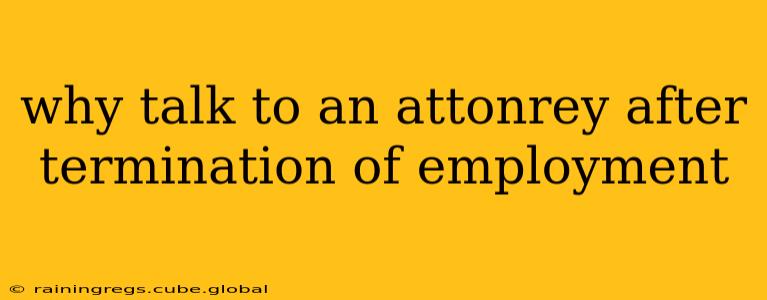Losing your job can be a jarring experience, filled with uncertainty and financial anxieties. While some terminations are straightforward, many situations involve complexities that could significantly impact your future. This is why consulting an attorney after termination of employment is often crucial, even if you feel the process was fair. This article will explore several key reasons why seeking legal counsel is a smart move after being let go.
What are my rights as an employee?
This is a fundamental question many face after termination. Employment laws vary significantly by location and often depend on factors such as the length of your employment, your role within the company, and the reason for your dismissal. An attorney can clarify your rights under federal and state laws, ensuring you understand your legal standing and potential avenues for recourse. This understanding is critical to making informed decisions about your next steps. They can explain concepts like wrongful termination, severance packages, and unemployment benefits, providing context specific to your situation.
Was my termination wrongful?
Wrongful termination occurs when an employer fires an employee for illegal reasons, such as discrimination based on age, race, religion, gender, or disability; retaliation for whistleblowing; or breach of contract. Determining whether your termination constitutes wrongful termination requires a careful review of the circumstances surrounding your dismissal and applicable employment laws. An attorney can analyze your case, evaluate the evidence, and advise you on the merits of pursuing legal action.
How do I negotiate a severance package?
Many employers offer severance packages after termination, but these are not always generous or fair. Negotiating a severance package can significantly impact your financial stability during your job search. An attorney can help you understand the value of your severance package offer, advise on counter-offers, and navigate the negotiation process to secure a more favorable settlement. They can also help ensure the package complies with all legal requirements and protects your rights.
What about unemployment benefits?
Filing for unemployment benefits can provide crucial financial support during your job search. However, the process can be complex, and employers sometimes contest claims. An attorney can guide you through the application process, assist in preparing your documentation, and represent you if your claim is contested. This support can increase your chances of receiving benefits and reduce the stress associated with navigating the unemployment system.
Can I sue my former employer?
While not all terminations warrant legal action, some situations justify filing a lawsuit. An attorney can assess the strength of your case, explain your legal options, and help you determine whether pursuing a lawsuit is the best course of action. This decision requires careful consideration of potential costs, risks, and benefits. A lawyer will provide clear and informed guidance on these matters.
I'm worried about my reputation.
Losing your job can be stressful, and concerns about your professional reputation are valid. An attorney can advise you on how to handle references, recommendations, and potential defamation. They can help protect your professional standing and navigate sensitive situations while ensuring compliance with legal standards regarding your professional reputation.
In conclusion, consulting an attorney after termination of employment is a proactive step that can protect your rights, financial security, and professional reputation. Even if you believe the termination was fair, an attorney can offer invaluable guidance and support during a challenging transition. The potential benefits of securing legal advice often outweigh the costs.
